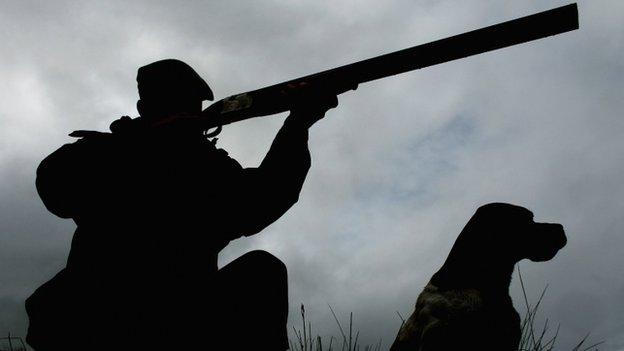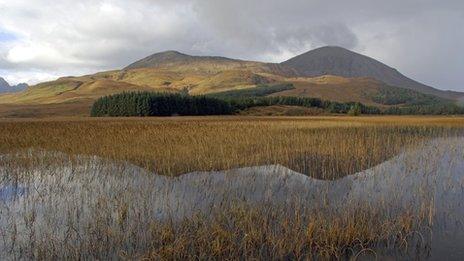Land ownership reforms proposed
- Published

The Land Reform Review Group's report sets out 62 recommendations in its 260 pages
There should be an upper limit on the amount of land held by private owners in Scotland, a government-commissioned study has recommended.
The Land Reform Review Group, external also called for a big increase in community land ownership.
And the group said the current tax system should be changed.
Tax "plays an important part in maintaining the concentrated pattern of large scale, private land ownership in Scotland," it stated.
The Scottish government believes the country needs a fairer distribution of land ownership, and is aiming reduce the dominance of large, traditional sporting estates.
The report's authors said the Scottish government should establish a Community Land Agency to facilitate negotiations between landowners and communities, with the goal of achieving a "significant increase in local community land ownership".
But they warned that public funding remained "critical" and the Scottish government must ensure there is an "integrated legislative and financial support structure" to help communities in urban and rural Scotland buy and develop land and buildings.
The review group also argued that ending the Crown Estate Commissioners' involvement in Scotland would "deliver wide ranging and important benefits."
It said the responsibilities of the Crown Estate Commissioners in Scotland should be devolved to the Scottish Parliament.
Elsewhere, the report said there was a clear need to update Scotland's system of compulsory purchase and local authorities should be given new powers to issue compulsory sale orders.
The review group said that would help address the "persistent challenge of vacant and derelict land in urban areas".

The Scottish government wants to end the dominance of large, traditional sporting estates
The group had been asked to look at how best to enable more people in rural and urban Scotland to have a stake in the ownership, governance, management and use of land.
The wide ranging 260-page report also contains 62 recommendations with a focus on the public interest and making the most of land use in Scotland.
Environment Minister Paul Wheelhouse said the relationship between the land and the people of Scotland was fundamental to the country's economic, environmental and social success.
He added: "We will study the report in depth and consider its recommendations. I am sure it will contain recommendations we agree with and some we do not but I welcome the overall vision and proposed direction of travel.
"I am pleased to read the recommendations on improving the availability of land, both rural and urban, and the need to increase access to rural housing, these are issues that will have a direct impact on many people's lives.
'Direction of travel'
"The group have also highlighted the need to address transparency of land ownership in Scotland which I believe is crucial to taking forward this agenda."
Mr Wheelhouse welcomed the fact that the benefits of community ownership had been highlighted in the report.
He said: "We have always said that community ownership empowers communities, sparks regeneration and drives renewal which is why we have an ambitious target to get one million acres of land into community ownership by 2020.
"I am pleased to announce that I agree with the review group's recommendation for a working group to develop the strategy for achieving the million acre target and I will shortly be forming a working group to achieve just that.
"Land reform not just about land ownership but how that land is used and managed and the benefits it can bring to the people of Scotland."
'Extremely disappointing'
Scottish Land & Estates, which represents landowners throughout Scotland, said the report had "missed the opportunity to deliver constructive land reform" and failed to address the real challenges facing rural Scotland.
Chief executive Douglas McAdam said: "This report is extremely disappointing in that it does not reflect the very substantial social, economic and environmental contribution made to Scotland by private landownership of all scales - something that successive Scottish administrations have recognised.
"Instead, the report contains a very negative view of landowners despite the fact that in its first report the review group acknowledged and highlighted quite fully the very constructive work private landowners were engaged in."
He added: "The Land Reform Review Group has focused far too much on ownership rather than how land can be used to provide multiple benefits and has missed the opportunity to make more constructive proposals around community planning - which is critical to empowering communities and rural development."
Scottish Greens co-convenor Patrick Harvie said the response of the Scottish government to the report would be a "test of their ambition for a fairer Scotland".
He added: "This is a comprehensive piece of work with many new ideas for addressing the concentration of wealth and land in our country.
"The minister asked for this review to be radical and now he must show this was not just posturing by accepting the need for the big tax changes recommended in the report."
In a statement, the Crown Estate said it would respond in detail to the report in due course, adding: "We are committed to Scotland and work closely with communities, customers and government, helping drive sustainable growth in offshore renewables, marine leisure and aquaculture."
- Published8 January 2014

- Published7 June 2013
